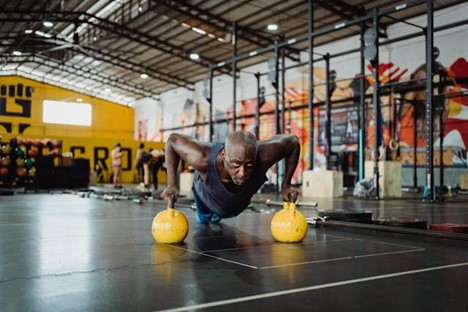
The most important skill we can develop is the capacity to make good choices.
The choices we make about food and exercise influence our physical health. The choices we make about how to respond to life’s adversities affect our success and psychological wellbeing. And the choices we make about self-improvement direct the very course of our lives.
One of the best ways I’ve found to make better choices is to remember the impact my present actions will have on my future selves. It also helps to keep in mind that, although I may not enjoy doing what’s best for me, I won’t regret it.
Digging deeper, I realized that awareness of your ability to choose is paramount. You have to remember that you always have the power to choose. This prevents you from being a passive victim of whatever happens to you.
You’re Always Choosing
The first step to exercising your power of choice is simply recognizing that you are making choices.
Philosophical debates about free will notwithstanding, every action we take that isn’t pure, reactive instinct is a choice. Even avoiding making a choice is a choice: You’re chosen the status quo.
“If you choose not to decide you still have made a choice.” –Rush1
Often my work with students is simply pointing out the choices they’re making – choices of which they’re unaware.
For example, if a student doesn’t understand their math homework, I ask them to pull out their notes, but they don’t have any. Next, I ask if they requested help from the teacher or asked questions in class, and they say they didn’t.

I then point out that while they were sitting passively in class, confused by the new math topic, they chose not to write down what the teacher was doing on the board, and they chose not to ask for help. They didn’t realize they were making those choices, so they didn’t realize that they could choose differently.
The reason it’s so important to recognize that you’re making choices is that it gives you power. If you don’t like the results your choices are getting you, you have the power to make better ones. If you don’t feel proud of the life you’re living, you can choose to change.
This is the mindset of an active agent: someone who is in charge of their own behavior, who is response-able in every situation. Don’t be a passive victim of life’s difficulties, the world’s injustices, or your own bad habits. Choose to take action.
Habits Are Choices

Some people think that when a well-ingrained habit – good or bad – is a part of your daily life for a long time, the behavior ceases to be a choice, but I think this is wrong.
When I was a marijuana addict, every time I got high was preceded by a choice to get high. Because I was an addict, I rarely questioned that choice. I didn’t argue with the thoughts that justified the choice. I didn’t doubt the validity of the emotions that made the choice feel acceptable. The choice was quick and routine and nearly automatic – but not entirely automatic. I was still choosing to get high. This is critical because it meant that I could choose differently. And, one day, I did.
Now I’ve been clean and sober for about a decade, so not getting high has become a deeply ingrained habit. But it’s still a choice. Every time I’m around people who are smoking weed and every time I drive by a pot shop, I choose to remain clean and sober. It’s an easy and obvious choice now, but I’m still exercising my power of choice.
Likewise, my meditation practice is so well established that it occurs at the same time, in the same place, in the same way every morning. But it remains a choice. I haven’t missed a day in many years, but I could choose to stop meditating tomorrow.
Choices vs. Abilities
“It is our choices, Harry, that show what we truly are, far more than our abilities.” –Albus Dumbledore2
I spent most of my life believing the opposite of Dumbledore’s wisdom. I had what’s known as a “fixed mindset.” I believed that the abilities I’d been gifted through genetics are unchangeable, and I believed that it was better to be seen as smart than to work hard.3

I made countless poor choices because of this mindset. I thought procrastinating and doing the bare minimum were things to be proud of. Sadly, this is not uncommon.
Often people with great abilities make similarly poor choices and then get upset about the consequences. Because they have great potential, they believe the world owes them something. What they fail to recognize is that the world doesn’t care about your potential; it only cares what you do. Being brilliant or talented doesn’t exonerate you from hard work.
You’re smart? Prove it.
You’re creative? Make something.
You’re talented? You’re not alone, so you’ll still have to develop your talent if you want to stand out.
Eventually, I shifted to a “growth mindset,” which is the belief that we can become better through effort and strategy.3 I realized the truth: Our abilities are meaningless if they’re not put to use, and good choices cause our abilities to grow.
I used to self-identify as someone who was “smart” and “a good writer.” Now I’ve shifted to a process-based identity: I see myself as someone who is constantly learning and writing on a daily basis.
Instead of being fixated on my abilities, I’m focused on my choices.
What life will you choose?
Recognizing that you always have the power to choose is liberating. It means you can decide where you want to go in life. It means you can, through the choices you make, bring forth your incredible human potential.

“A ship in harbor is safe – but that is not what ships are built for.” –John A. Shedd4
Abraham Maslow taught that each moment presents you with a choice: You can step forward into growth or backward into safety.5
Choosing to try something new or challenging yourself can be scary, but it’s the only way forward. It’s easier to stay in your comfort zone and choose the status quo, but is that the kind of life you want to live?
Wouldn’t you rather use the power of choice to live an extraordinary life?
1 Rush. “Free Will.” Permanent Waves. Anthem, 1980.
2 Rowling, J. K. Harry Potter and the Chamber of Secrets. Scholastic, 1999. Video book summary.
3 Dweck, Carol. Mindset: The New Psychology of Success. Ballantine Books, 2007. Video book summary.
4 John A. Shedd Quotes. Goodreads.com
5 Maslow, Abraham. Motivation And Personality: Unlocking Your Inner Drive and Understanding Human Behavior. Harper Collins, 1987. Video book summary.
